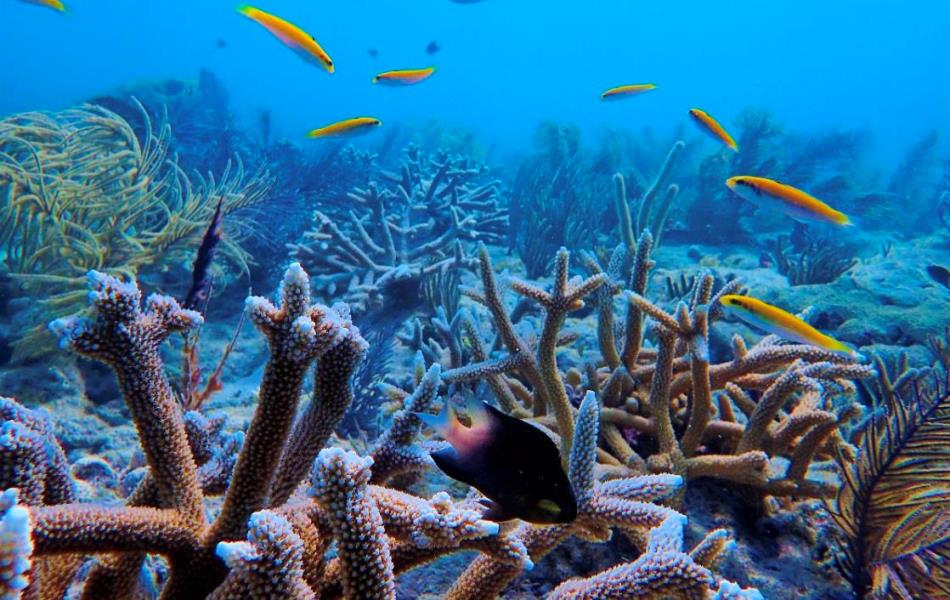On April 24, 2023, Sarasota, Florida-based Mote Marine Laboratory announced that it has been awarded nearly $7 million from the National Oceanic and Atmospheric Administration (NOAA).
The funding is for a four-year, multi-faceted project focused on implementing a holistically transformative coral reef restoration initiative at 10 reef sites along Florida’s Coral Reef, just offshore of the Florida Keys Archipelago.
Dr. Michael P. Crosby, Mote President & CEO, said, “Over the last decade, Mote has been a leader in changing the paradigm for coral restoration science in Florida and around the world as a result of our coral genetic resiliency and microfragmentation-fusion research. We have been proud to be a core science partner institution in NOAA’s Mission: Iconic Reefs (M:IR) program since its inception. With this new NOAA grant, we will build on our history of innovative science and success in restoring over 200,000 corals to date by launching a transformational initiative focused on holistic coral reef community restoration under the leadership of Mote’s Coral Reef Restoration Research Program Manager, Dr. Jason Spadaro.”
Led by Principal Investigator Dr. Spadaro, this four-year initiative seeks to substantially expand Mote’s capacity to conduct groundbreaking restoration of coral reef habitats.
The then-nascent science of coral reef restoration was first documented in the groundbreaking 2002 book, The Restoration Economy. Author Storm Cunningham worked with the late, great German scientist Wolf Hilbertz on the world’s first coral reef restoration technology in Jamaica.
“Coral reef restoration is still essentially in its infancy, but we believe that this project and the ambitious objectives we have set, represent a science-based and scalable pathway to transformative and, more importantly, lasting landscape scale functional restoration of the most biodiverse and socio-economically valuable habitat and natural resource in Florida,” Dr. Spadaro said.
Global, regional, and local stressors have significantly contributed to the decline of our coral reef ecosystems, most notably in Florida and the Wider Caribbean Region.
Living coral cover (the proportion of the reef covered in living coral) on Florida’s Coral Reef is currently between 1 and 5 percent, dramatically less than just 40 years ago when it was more than 30%.
Many factors make a natural recovery of Florida’s Coral Reef unlikely and nearly impossible on a timescale relevant to humans. The recovery of function on Florida’s Coral Reef is likely now entirely dependent upon adaptive management and pro-active science-based restoration.
As part of its $7 million NOAA Transformational Habitat Restoration and Coastal Resilience award, Mote is committed to immediately commence its holistic coral reef community restoration efforts at ten coral reef sites throughout the Florida Keys National Marine Sanctuary.
Seven of these sites comprise the seven iconic reefs of NOAA’s M:IR program, while the remaining three sites are outside the M:IR, in order to further strengthen and broaden the resulting scientific insights and impacts of the Mote-led initiative.
Mote scientists have set four major objectives for the project:
1. Commence or expand restoration efforts at all 10 reef sites:
This effort includes the production and outplanting of 242,000 coral fragments and 34,000 Caribbean king crabs over the four-year project duration. Caribbean king crabs, a large native herbivore, aid in the restoration of coral reefs by consuming algae and improving habitat conditions for corals and fishes to grow, reproduce, and thrive. The crabs consume the algae that plague corals and restrict their ability to settle, grow, and reproduce.
2. Scale Mote’s restoration efforts, and effect, by iteratively increasing cost efficiency in production and outplanting operations:
This includes developing and using new science-based methods, materials, and workflows to inform, guide, and enhance our efforts in the production, outplanting, and monitoring of corals, including expanding the use of Structure from Motion 3D photogrammetry technology for restoration planning and monitoring.
3. Increase production and implementation of Caribbean king crabs to facilitate restoration success:
Caribbean king crabs are large native reef herbivores but aren’t currently present on our reefs in large enough numbers to keep algae under control. Mote will immediately expand the production of Caribbean king crabs at its newly constructed grazers production facility at Mote Aquaculture Research Park just outside of Sarasota. A major objective is the development and implementation of a State- approved Veterinarian health certification protocol, a necessary regulatory authorization for releasing the cultured crabs onto Florida’s Coral Reef. After this critical regulatory framework is executed, Mote will be the first institution to release cultured Caribbean king crabs on Florida’s Coral Reef to support and facilitate coral reef restoration efforts.
4. Apply science-based methods to ensure a genetically diverse and resilient restored coral reef community:
Mote will apply its genetic management, sexual reproduction, and resilience screening workflows to guide the production and outplanting of corals that have demonstrated resilience to known stressors such as disease and climate change. The active screening of coral genotypes to known stressors allows Mote scientists to identify and thoughtfully incorporate these resilient and resistant genotypes into our restored coral populations.
Photo of restored coral reef courtesy of Mote Marine Laboratory.

